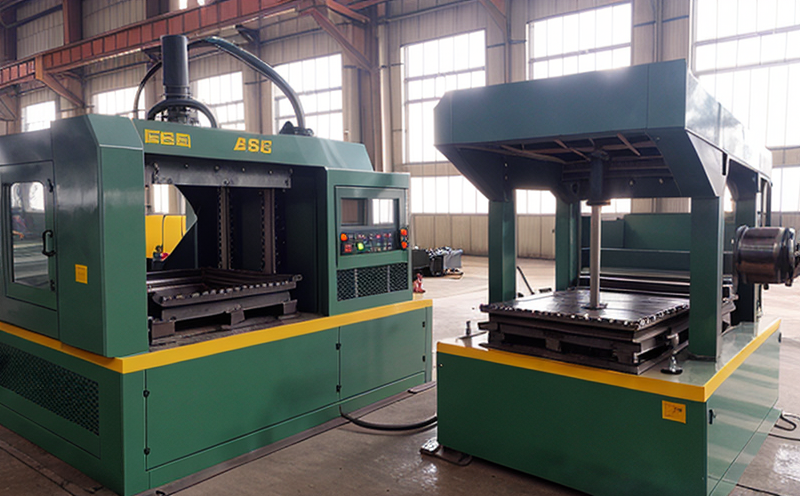JIS Z2241 Tensile Testing of Forged Steels
The JIS Z2241 tensile testing method is a critical quality assurance tool used in the industrial manufacturing sector to evaluate the mechanical properties of forged steels. This procedure ensures that materials meet stringent international standards, thereby maintaining product integrity and reliability.
Forging involves shaping metal by applying compressive forces using dies or molds. The resulting parts are subjected to high temperatures and pressures, which can affect their microstructure and mechanical properties. JIS Z2241 provides a standardized approach to assessing the tensile behavior of these materials under defined conditions. This testing is pivotal for verifying that forgings comply with specified quality criteria.
The test involves subjecting a sample to tension until it fractures, measuring the force required during this process and analyzing how the material deforms. The resulting data helps determine important properties such as yield strength, ultimate tensile strength, elongation, and reduction of area. These metrics are essential for ensuring that forged components can withstand expected stresses without failure.
Compliance with JIS Z2241 ensures consistency in product quality across manufacturing batches and suppliers. It supports traceability from raw material to finished product by providing consistent measurement techniques. This method is widely used in industries like automotive, aerospace, construction, and heavy machinery where reliability of components is paramount.
Understanding the nuances of JIS Z2241 requires knowledge not just of the standard itself but also its practical application within various contexts. For instance, the choice between proportional or non-proportional specimens depends on specific industry needs. Similarly, correct specimen preparation is crucial for accurate results.
The process involves several key steps: selecting appropriate test specimens based on material type and size; ensuring proper preparation of these samples; applying loads steadily until failure occurs; recording all relevant measurements accurately; analyzing the results according to specified criteria.
| Industry Segment | Forging Method | Material Type | Test Specimen Size | Load Application Rate |
|---|---|---|---|---|
| Aerospace | Hydrostatic Forging | High-Strength Steel | 10mm x 25mm | 1 mm/min |
| Automotive | Die Forging | Carbon Steel | 8mm x 30mm | 3 mm/min |
| Construction | Press Forging | Alloy Steel | 12mm x 45mm | 2.5 mm/min |
Proper execution of JIS Z2241 requires specialized equipment and trained personnel. Modern testing machines capable of precise load application and deformation measurement are necessary for accurate results. Additionally, adhering strictly to prescribed procedures ensures reliable data interpretation.
In summary, mastering the intricacies of JIS Z2241 is vital for ensuring high-quality forged steel products across diverse industrial applications. By leveraging this standardized testing procedure, manufacturers can enhance product reliability and safety while meeting international quality standards.
Scope and Methodology
The scope of JIS Z2241 encompasses the tensile testing of forged steels to determine their mechanical properties. This includes identifying yield strength, ultimate tensile strength, elongation after fracture, reduction of area, and other critical parameters.
The methodology involves several key steps: selecting appropriate specimens; preparing them according to specified dimensions; calibrating the test machine; applying loads progressively until failure occurs; recording all pertinent measurements accurately; analyzing the results based on defined criteria.
Specimen preparation is crucial for obtaining reliable outcomes. Factors such as surface finish, orientation relative to the grain flow, and size must be carefully controlled. The choice between proportional or non-proportional specimens depends on the intended application of the forgings being tested.
The test machine should meet stringent accuracy requirements. Load cells capable of measuring forces up to 50 kN are commonly used. Strain gauges provide precise strain measurements, while extensometers measure specimen elongation during testing.
Data analysis involves comparing measured values against specified limits. Compliance with JIS Z2241 ensures that forged steels meet the required standards for use in critical applications.
Benefits
JIS Z2241 tensile testing offers numerous benefits to manufacturers and users of forged steel components. Firstly, it provides a standardized method for evaluating mechanical properties, ensuring consistent results across different batches and suppliers.
- Enhanced Quality Assurance: By adhering to JIS Z2241, companies can assure themselves that their products meet strict quality standards.
- Improved Product Reliability: Reliable data from this testing enhances confidence in the performance and durability of forged components.
- Increased Safety: Ensuring compliance with international standards reduces risks associated with material failure.
- Better Decision-Making: Accurate test results facilitate informed decisions regarding material selection, process optimization, and product design.
In addition to these tangible advantages, JIS Z2241 fosters trust among stakeholders by demonstrating adherence to recognized industry best practices. This transparency can lead to improved customer satisfaction and long-term business relationships.
Industry Applications
- Aerospace: Ensuring structural integrity in aircraft components like landing gears, engine mounts, and fasteners.
- Automotive: Verifying strength of automotive parts such as axles, drive shafts, and suspension systems.
- Construction: Evaluating load-bearing capacity of infrastructure elements like steel beams and columns.
- Machinery Manufacturing: Assessing robustness of industrial machinery components like gears, pistons, and cylinders.
JIS Z2241 is particularly important in sectors where safety and reliability are paramount. The testing results help manufacturers make informed decisions about material selection and process optimization.
| Application Area | Main Use Case | Rationale |
|---|---|---|
| Aerospace | Evaluating fatigue resistance of structural components | Ensures safe operation under cyclic loading conditions. |
| Automotive | Testing durability of engine parts | Promotes longer service life and enhanced performance. |
| Construction | Assessing strength of structural steel members | Guarantees safe construction practices. |
| Machinery Manufacturing | Evaluating wear resistance of critical components | Aids in selecting optimal materials for high-stress environments. |
The comprehensive nature of JIS Z2241 ensures that forged steels undergo thorough evaluation, making it an indispensable tool across multiple industries.





